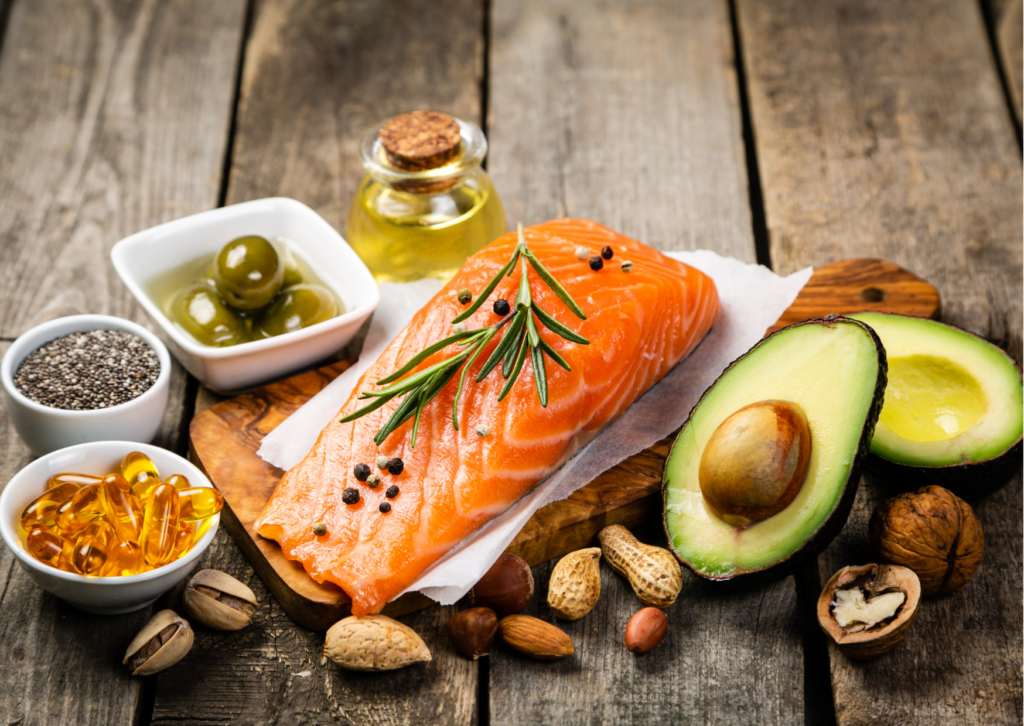Embracing Fats: Why They’re Essential for a Healthy Diet
In recent years, the fear of fat has been ingrained into our dietary culture, perpetuated by the marketing of “low-fat” and “fat-free” foods. However, it’s time to dispel this misconception and understand why these are actually crucial for our well-being.

Debunking the Myth
The notion that “eating fat makes you fat” is a common misconception. However, while it’s true that trans and saturated fats should be consumed in moderation, poly and monounsaturated fats—found in foods like avocados, nuts, fish, seeds, and greens—are essential for optimal health.
The Importance of Healthy Fats
Here’s why fats are necessary components of a balanced diet:
Cell Growth: Fats are integral for the structure and function of cell membranes, supporting overall cellular health and function.
Regulated Blood Sugar Levels: Healthy fats help to stabilize blood sugar levels, which is crucial for sustained energy throughout the day and reducing the risk of insulin resistance.
Lowering LDL Cholesterol: Certain fats, such as those found in nuts and olive oil, can help reduce the “bad” LDL cholesterol in the body, thereby promoting heart health.
Vitamin Absorption: Helps absorb fat-soluble vitamins (A, D, E, and K) crucial for vision, bone health, and immune function.
Healthy Blood Pressure: Omega-3 fatty acids, found abundantly in fatty fish like salmon and mackerel, contribute to maintaining healthy blood pressure levels and reducing inflammation.
Impact of Fat Deprivation
Cutting out essential fats from your diet can have detrimental effects on your health:
Reduced Energy: These are dense energy sources, containing over twice the calories per gram compared to carbohydrates and proteins. Inadequate fat intake can lead to lethargy and fatigue.
Nutrient Deficiencies: Fat is necessary for the absorption of fat-soluble vitamins. Insufficient dietary fat can cause deficiencies in essential vitamins such as vitamin A, crucial for vision, and vitamin D, essential for bone health.
Hormonal Imbalance: Fats play a role in hormone production. Insufficient fat intake can disrupt hormone balance, potentially leading to issues such as irregular menstruation and reproductive problems
Embracing the Right Fats
Instead of avoiding these altogether, focus on incorporating healthy fats into your meals:
Avocados: Rich in monounsaturated fats, avocados are versatile and delicious additions to salads, sandwiches, and smoothies.
Nuts and Seeds: Snack on a handful of almonds or sprinkle chia seeds over yogurt for a dose of healthy fat and protein.
Fatty Fish: Enjoy grilled salmon, sardines, or trout regularly to benefit from omega-3 fatty acids.
Olive Oil: Use extra virgin olive oil as a dressing for salads or cooking oil for sautéing vegetables.
Embrace the importance of fats for a balanced diet, promoting overall wellness through informed health choices.
Have you ever fallen prey to the “low-fat” diet myth? Share your experiences and let’s break free from this misconception together!
Submit your application for the Signature Program of the Gut Health Agency by following this link: https://bit.ly/Apply-to-GHA
April 29, 2024
Leave a Reply Cancel reply
Podcast
Have you tuned in?
Let's Start Health; a podcast willing to start the awkward, vulnerable, and even hard conversations needed in order to break through stigmas of mental and physical health, as well as educate and inspire those on a journey to healing. Hosted by Chelsea Haines.
Be the first to comment